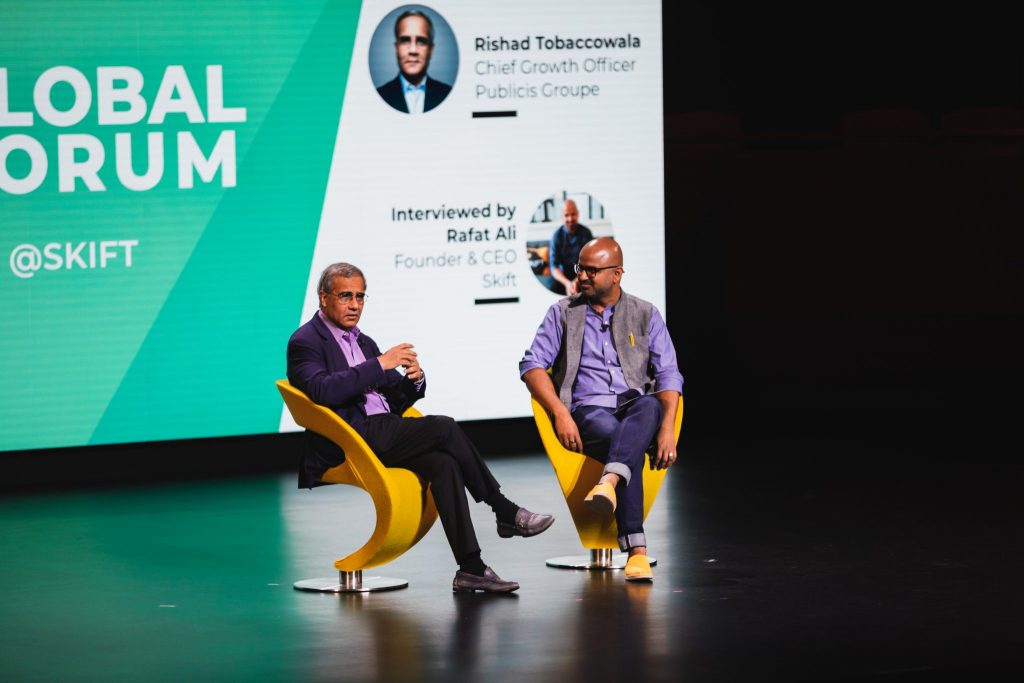Skift Take
Advertising legend Rishad Tobaccowala lashes out at an over-dependence on data, and believes so-called FAANGs must be broken up. All this simply makes his forthcoming book, Restoring the Soul of Business: Staying Human in the Age of Data, a must-read for decision makers in travel.
 The oracle of the advertising industry, Rishad Tobaccowala, has warned travel marketers about the dangers of being overly-dependent on data-driven companies, and in the process losing sight of the customer as a human being.
The oracle of the advertising industry, Rishad Tobaccowala, has warned travel marketers about the dangers of being overly-dependent on data-driven companies, and in the process losing sight of the customer as a human being.
Speaking at Skift Global Forum on Thursday, the chief growth officer of Publicis Groupe observed that his “major clients, marketers and every business” have tilted towards data over the last four to five years because the five most-known companies in the United States — the so-called FAANGs (Facebook, Apple, Amazon, Netflix and Alphabet’s Google) — are data-driven.
“Business after business orbit to the large platforms, to such an extent they become data-driven, short-term and completely undifferentiated. They do it willingly as they have no option. Then they basically say we don’t know how to differentiate [ourselves]. If you only play on that, you can’t differentiate [yourself],” said Tobaccowala.
“Data is essential, but in addition you need culture, people, and storytelling. The future will be about data-driven storytelling.”
Data storytelling, simplistically, is about translating data analyses into layman’s terms in order to influence decision making or action.
Companies such as Google or Facebook make their money from advertising and those advertising platforms have become so powerful that they have become, in essence, society platforms that have caused the “massive rise of inequality, hatred of the other, and complete break of trust,” he lambasted.
He observes that these companies are themselves starting to have a sense of the damage and understanding that this could hurt their businesses. A huge danger is attracting talent as people begin to ask the question: What sort of company do we work for? And suddenly they say they don’t want to work at a particular company.
Tobaccowala believes Facebook’s job acceptance rate, for example, has gone down to 50 percent from 89 percent.
“You have four types of optionalities,” he told the audience. “One, data optionally. If all is data, you’re dead. Second, reputational optionality. A lot of people are asking who is funding these companies.
“Third, brand optionality — regardless of what they say, these companies don’t have control of how their platforms work. If you look into what’s behind it, it’s like sausage-making, so your brand will always get into trouble.
“Fourth, strategic optionality: When I hear someone say I’m so dependent on them, I don’t know what else to do, you’ve failed as a leader. You basically have given up your company. If you continue to be over-dependent on them, it’s a big issue. I truly believe they have to be broken up,” said Tobaccowala, to applause from the audience.
He said we will be entering the fourth connected age with 5G ushering an even faster way of connecting.
The first connected age, from 1989 to 2007, was built on search and e-commerce and heralded the Amazon and Google-era. The second was built on mobile and social — think Apple, Facebook, and Twitter that connected to everybody all of the time. The third, since 1997, is data connected to data — what artificial intelligence and machine learning are; things connecting to things, which is IoT (Internet of Things); and new ways of connecting, the first big one of which is voice.”
All of this, said Tobaccowala, transforms society, and travel. “Without the second connected age, for example, you wouldn’t have Airbnb or Uber,” he said.
“The secondary effects of all this are to completely dismantle and rebuild every industry.”
The Daily Newsletter
Our daily coverage of the global travel industry. Written by editors and analysts from across Skift’s brands.
Have a confidential tip for Skift? Get in touch
Tags: sgf2019, skift global forum
Photo credit: Publicis Groupe Chief Growth Officer Rishad Tobaccowala (left) speaks at Skift Global Forum in New York City on Sept. 19, 2019. Skift
